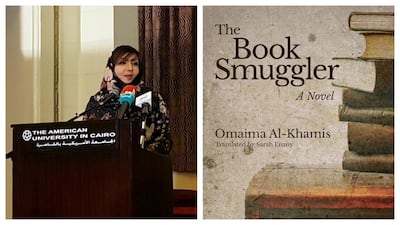From a distant village in the Arabian Desert all the way to Baghdad, Jerusalem, Cairo, Granada and Cordoba, such was the route of Mazid Al-Hanafi, an 11th-century bookseller and chief protagonist of The Book Smuggler, a 2018 award-winning novel by Saudi writer Omaima Al-Khamis.
At a time when fundamentalism was on the rise, eventually halting the intellectual renaissance that flourished in medieval Islamic cities, Mazid Al-Hanafi joins a secret society that saves books from the danger of burning by disseminating them across Islamic cities. The novel follows Al-Hanafi’s thrilling journey across these capitals.
Upon its release, the novel, originally written in Arabic, garnered much critical acclaim. It scooped the 2018 Naguib Mahfouz Medal for Literature and was also long listed for the International Prize for Arab Fiction in 2019.
'The Book Smuggler' is translated into English
"You will notice that Mazid Al-Hanafi did not emerge from the famous Arab cities of the time, be they Baghdad, Damascus, Jerusalem or Cairo," Al-Khamis tells The National on the occasion of the release of the novel's English translation by Egyptian translator Sarah Enany and published by AUC Press.
"On the contrary, he came from the Arabian Peninsula, particularly Al-Yamamah region in today’s Najd. This region has been marginalised, with the focus always centred on other cultural capitals of the time."
The novel was an attempt on Al-Khamis's part to rewrite Najd – "once the birthplace of the poets of Al-Mu'allaqat who wrote their poems in gold and hung them up on the walls of the Kaaba" – into the official historical narrative that had thus far overlooked it.
Al-Khamis says she had an urge to “shed light on the intellectual experience of Najd”, as well as “question why [Arab] reasoning had waned”.
According to her, philosophy books were once worth their weight in gold in Baghdad's House of Wisdom (Bayt al-Ḥikmah). The heavy translation activity that unfolded in Bayt al-Ḥikmah coincided with the emergence of a number of schools (madhahib) that rejected copying, and celebrated reason.
“These [schools] nestled the intellectual enlightenment that was aborted later on,” Al-Khamis says.
An exercise in exquisite language
Besides striking this balance between the historical and the fictional, another remarkable feat of this novel is how Khamis succeeds to convey the ancient mood of the novel linguistically – by writing in exquisite classical Arabic.
This is also precisely where Enany, literary translator and professor in the English Department of Cairo University, scores big. In the English translation of the novel, Enany stays loyal to the mood of the source text by writing in an archaic – yet equally accessible – form of English.
"The actual structure of paragraphs and texts was not necessarily old-fashioned or unusual. But the vocabulary and some of the descriptions were definitely engineered to evoke an older time," Enany tells The National.
"Frequently, a carpet is just a carpet or a rug. I remember Omaima using a very unfamiliar Arabic word, which I had to look up in a dictionary of ancient Arabic and I thought, 'How am I going to defamiliarise this in English?' But sometimes you really can't and have to use the contemporary equivalent," she says.
While opting for a Shakespearean language would have made the book “practically incomprehensible”, Enany realised that what was required in her translation of the novel was “really just a hint of a different era”.
She settled on "using more formal verbs instead of verbs with particles, a slightly more convoluted sentence structure with more run-on sentences than you would do if you were going for a contemporary vibe, and generally maybe older versions of words where possible".
'The reader could feel underestimated'
Enany has also translated Les Miserables into Arabic, but she regards The Book Smuggler as a relatively easier project "because the farther back in time you go, the closer together American and British English seem to become".
In her translation of the novel, Enany demonstrates incredible sensitivity to the different types of writing found in the source text, which range from narration to actual diaries found within the narration, conveying them "into specific tones" in her translation.
In the process of writing the book, Al-Khamis studied the works of contemporary writers – the likes of Georges Tarabichi and Mohammed Abed Al-Jabri – who wrote about Arab reasoning and logic, and traced the reasons behind the quashing of the spark of enlightenment in Baghdad's Bayt al-Ḥikmah about 1,000 years ago.
She also sought to accurately document the historical setting of the novel by examining texts by Ibn Kathir and Ibn Hisham, among other sources.
The writer of the historical novel, Al-Khamis asserts, should be careful not to “choose a character that doesn’t synchronise with the time setting of the novel they’re writing, or the whole structure of the novel could crumble”.
"The reader could feel underestimated, and could potentially turn away from the book," Al-Khamis says.
That is where Al-Khamis succeeds, transporting her readers to a completely different era as Al-Hanafi goes on this journey of a lifetime.
The Book Smuggler is published by AUC Press and is out now

